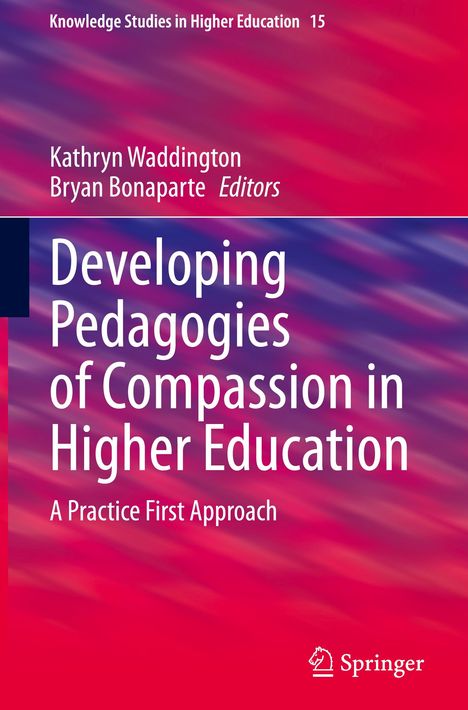Developing Pedagogies of Compassion in Higher Education, Gebunden
Developing Pedagogies of Compassion in Higher Education
- A Practice First Approach
(soweit verfügbar beim Lieferanten)
- Herausgeber:
- Bryan Bonaparte, Kathryn Waddington
- Verlag:
- Springer Nature Switzerland, 09/2024
- Einband:
- Gebunden, HC runder Rücken kaschiert
- Sprache:
- Englisch
- ISBN-13:
- 9783031675423
- Artikelnummer:
- 11966058
- Umfang:
- 316 Seiten
- Nummer der Auflage:
- 2024
- Ausgabe:
- 2024
- Gewicht:
- 641 g
- Maße:
- 241 x 160 mm
- Stärke:
- 23 mm
- Erscheinungstermin:
- 8.9.2024
- Hinweis
-
Achtung: Artikel ist nicht in deutscher Sprache!
Klappentext
This collection addresses intersections and gaps between practice, theory, and research that both connect and divide compassion and pedagogies. In foregrounding practice, it makes an important contribution to the growing call for universities and educators to adopt inclusive student-centred approaches that challenge us to fundamentally re-think what universities do. It celebrates the role of students as co-creators of knowledge, locating them at the heart of what pedagogies of compassion in higher education should feel like and look like. It examines how compassion can become both critical and strategic in order to disrupt systems and orthodoxies that are no longer fit for purpose in a post-pandemic world. The ultimate goal the book aims to address is the need for humane universities driven by compassion, rather than profit, which can help to build fairer and more socially just societies.
The book extends the theoretical and practical discussions of compassion as a fundamental organizing principle in higher education. It brings fresh interdisciplinary thinking, theories and approaches including the neuroscience of compassion, classical Eastern philosophies, intersectional compassion, sustainability, and environmental stewardship. It also includes critical reflection on experiences, challenges, barriers, and enablers, across multiple levels and perspectives. These range from reflections on compassion in the classroom to compassion in the boardroom, as well as in the many other spaces and places where learning occurs. It offers a creative collection of essays on compassionate practices in higher education, and appeals to anyone who is concerned about the moral standing of the university.
¿For some time now, we have been told that universities must be viewed on the business model, but this has only discouraged faculty, students and staff. As the contributors show, however, the very idea that teaching and educational practices could be more closely linked to compassion is definitely appealing, and it gives us a more inspiring way of thinking about the university of the future.¿
Richard J. White, Creighton University, Omaha, NE, USA


